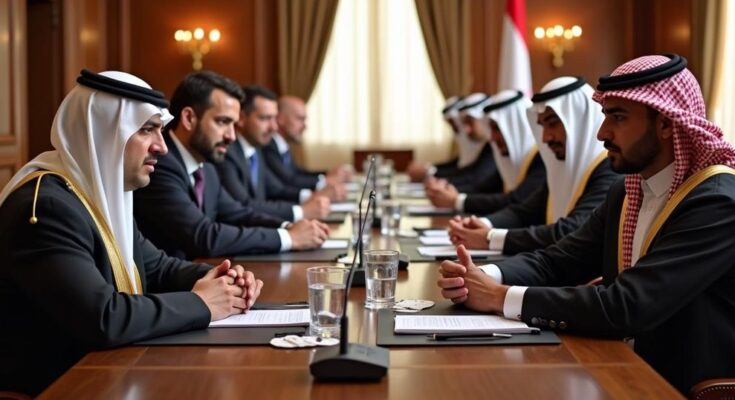Egypt’s Foreign Minister held discussions with Qatari and French counterparts regarding the situations in Gaza and Lebanon, focusing on ceasefires, humanitarian aid, and regional stability. Key points included concerns over the violence in Lebanon, the need to support Lebanese institutions, and Egypt’s role in facilitating Palestinian reconciliation.
On Saturday, Egypt’s Foreign Minister Badr Abdelatty engaged in a telephonic conversation with the Prime Minister and Foreign Minister of Qatar, Mohammed bin Abdulrahman Al Thani. Their dialogue centered around the critical situations in both Lebanon and Gaza. The ministers addressed efforts to secure a ceasefire in Gaza, ensuring the release of hostages and the unobstructed provision of humanitarian aid to the embattled region. Minister Abdelatty also underscored Egypt’s commitment to facilitating Palestinian reconciliation, as evidenced by hosting delegations from both Fatah and Hamas in Cairo. On a related note, Abdelatty communicated with France’s Foreign Minister, Jean-Yves Le Drian, on Friday regarding the escalating circumstances in Lebanon and Gaza. According to a statement by Egypt’s Foreign Ministry spokesperson, Ambassador Tamim Khallaf, Abdelatty voiced considerable concern regarding the recent surge in violence in Lebanon, particularly in light of incidents involving the Israeli military targeting UN peacekeeping positions, which resulted in injuries to two UN soldiers. He emphasized the necessity for the Israeli military to guarantee the safety and security of UN personnel and property amid these rising tensions. Minister Abdelatty called for immediate steps toward a ceasefire and a de-escalation of ongoing regional tensions, reaffirming Egypt’s dedication to preventing the situation from deteriorating further. He reiterated Egypt’s stance against any compromises on Lebanon’s sovereignty and territorial integrity and highlighted the importance of strengthening Lebanese institutions, particularly the Lebanese army. Furthermore, he advocated for compliance with UN Security Council Resolution 1701 in its entirety, which is aimed at enhancing stability in the region. The discussion between the ministers also encompassed the alarming humanitarian crisis in Lebanon as a consequence of the persistent Israeli aggression. They acknowledged the urgent need for humanitarian, medical, and shelter assistance for the Lebanese populace, who are grappling with the ramifications of over 1.2 million people displaced by the ongoing conflict. Abdelatty expressed profound concern regarding the deteriorating humanitarian conditions in Lebanon, urging for immediate relief to support the Lebanese government in addressing this critical situation. Additionally, Abdelatty reiterated the imperative need for a ceasefire in Gaza, ensuring complete access to humanitarian aid for the affected territories and urging an end to the Israeli assaults in the West Bank. He commended the support provided by France for Palestinian rights and the aspiration for the establishment of an independent Palestinian state in alignment with the two-state solution.
The ongoing conflicts in Gaza and Lebanon have drawn significant international attention and intervention, particularly from regional power players like Egypt and Qatar. The humanitarian crises in both regions, exacerbated by military actions and geopolitical tensions, have necessitated dialogue among foreign ministers aiming to stabilize the situation. Egypt has historically played a crucial role in mediating between Palestinian factions and advocating for ceasefires in conflicts involving Israel. Furthermore, the involvement of international actors, such as the United Nations and the French government, indicates a concerted effort to address the humanitarian needs of affected populations and uphold international resolutions designed to maintain peace and security in the region.
In conclusion, the dialogues conducted by Egypt’s Foreign Minister Badr Abdelatty exemplify the ongoing commitment of regional powers to forge humanitarian responses amid escalating violence in Lebanon and Gaza. Emphasizing the necessity of a ceasefire, humanitarian aid access, and respect for sovereign rights, these discussions are pivotal to fostering stability and preventing further humanitarian crises in the region. The collaborative efforts of various nations underscore the urgency of addressing the pressing needs of those affected by the conflicts.
Original Source: www.dailynewsegypt.com



